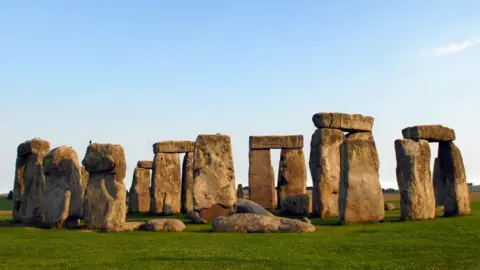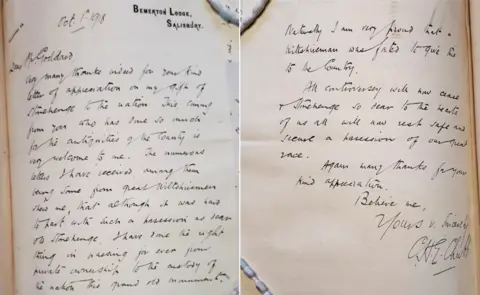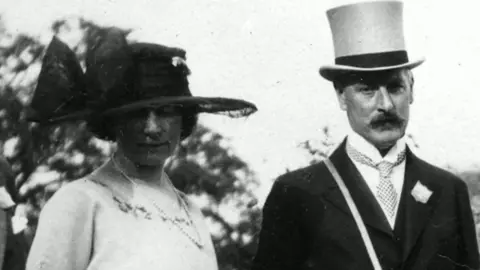Stonehenge: Last owner's letter found inside book
 BBC
BBCA thank you note from the last private owner of Stonehenge has been found inside a book at a museum in Wiltshire.
The ancient monument was bought by Sir Cecil Chubb for his wife in 1915 and given to the nation in 1918.
In the letter, discovered at Wiltshire Museum last week, Sir Cecil wrote that it had been "hard to part with such a possession" but he had "done the right thing" giving it to the country.
Museum director David Dawson said he was overjoyed by the "exciting find".
 Wiltshire Museum
Wiltshire MuseumThe monument, along with 30 acres of adjoining downland, went to auction in Salisbury, in 1915.
It had been in the Antrobus family since the early 19th Century, but when the heir to the baronetcy was killed the estate was put up for sale.
Despite having no intention of bidding, Sir Cecil - a wealthy Shrewton resident - decided to buy the ruin for his wife. It is said she was not pleased.
In the 1918 letter - dated just before Stonehenge was handed to the nation via a deed of gift - Sir Cecil thanks the former president of the Wiltshire Archaeology Society for his "appreciation on my gift of Stonehenge to the nation".
He wrote: "The numerous letters I have received, among them being some from great Wiltshiremen show me, that although it was hard to part with such a possession as dear old Stonehenge, I have done the right thing in passing for ever from private ownership to the custody of the nation this grand old monument.
 Jane Hills
Jane Hills"Naturally I am very proud that a Wiltshireman was fated to give this to the country."
Mr Dawson said the letter offered a "fascinating insight" into the gift.
He said: "There was lots of controversy about Stonehenge being put up for sale and a lot of talk of saving it for the nation, but no-one came forward."
Mr Dawson said it was only by chance the letter had survived.
